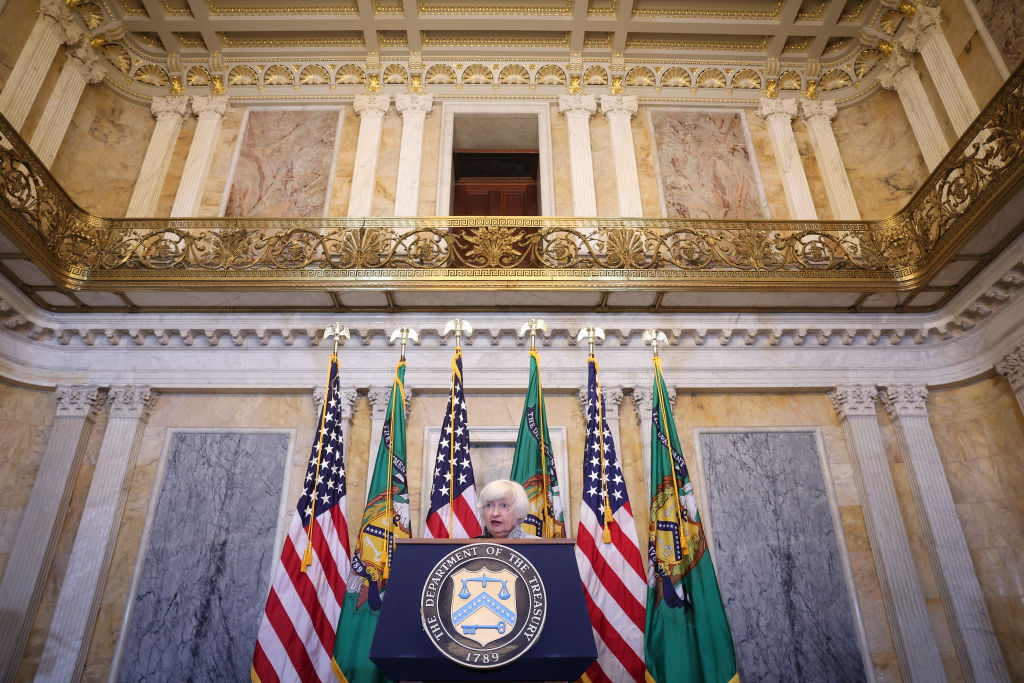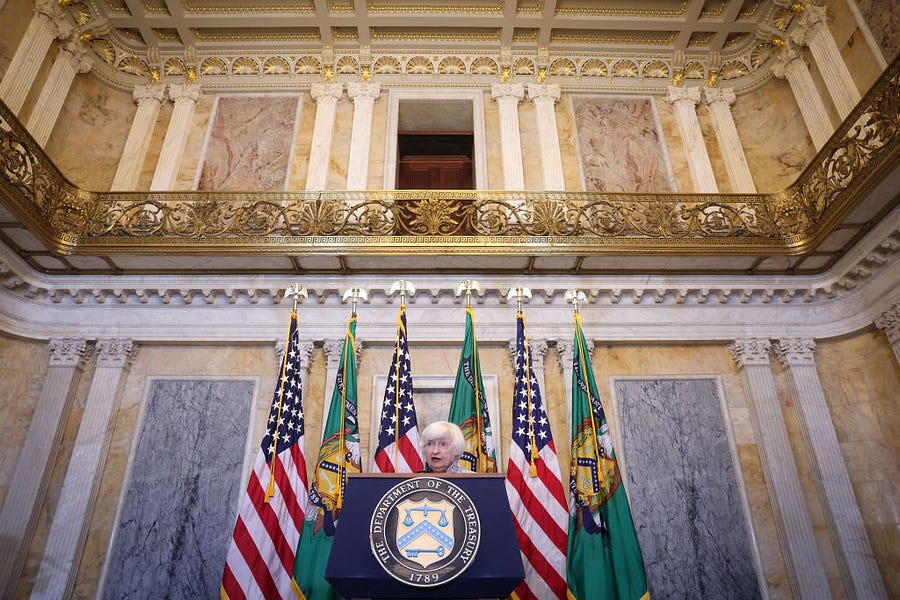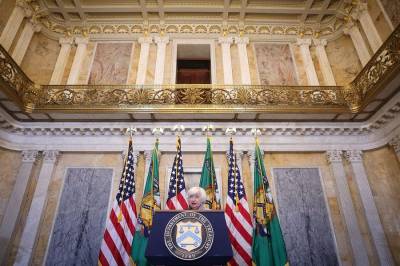Happy Monday, and a very happy August Recess to all who celebrate.
Quick Hits: Today’s Top Stories
More than 50 Ukrainian prisoners of war died early Friday in the bombing of a jail in the occupied Donetsk region. Ukrainian officials have accused Russia of deliberately striking the building to conceal evidence of torture, while Russian leaders claim without evidence that Kyiv bombed the prison as a “provocation.” Ukrainian President Volodymyr Zelensky has called for an international investigation and for the U.S. to recognize Russia as a state sponsor of terrorism.
Meanwhile, Russian shelling on the southern Ukrainian city of Mykolaiv this weekend killed Ukrainian grain tycoon Oleksiy Vadatursky in what Ukrainian presidential adviser Mykhailo Podolyak suggested was a targeted attack. Russia and Ukraine last week signed an agreement to resume grain shipments out of Ukraine and—although Russia attacked the Odesa port the next day—Turkish officials said Sunday the first loaded ship is expected to leave Odesa today.
The House on Friday passed—217 to 213—the Assault Weapons Ban of 2022, which would block the “sale, import, manufacture, or transfer of certain semi-automatic weapons,” but doesn’t call for the removal or confiscation of weapons Americans already own. The bill—in part a response to the recent spate of mass shootings—will likely fail in the Senate.
Thousands of anti-Iran protesters stormed Iraq’s Parliament in Baghdad on Saturday—the second time last week—to prevent the scheduled formation of a new government. The protesters support Moqtada al-Sadr, a Shiite cleric who emerged victorious in last year’s elections but resigned—alongside his supporters in Parliament—after failing for months to form a government.
House Speaker Nancy Pelosi confirmed Sunday she’s visiting Asia—including Singapore, Malaysia, South Korea, and Japan—but didn’t address whether she plans to make a reported stop in Taiwan. China has warned Pelosi against visiting the island, and state-controlled media said it was conducting military exercises off Taiwan’s coast Saturday on the heels of the democracy’s annual multi-day military exercises.
China’s real estate market has ended its brief recovery—China Real Estate Information Corp. said Sunday sales at the country’s top 100 property developers dropped 28.6 percent in July from June. The Chinese National Bureau of Statistics reported Sunday that the country’s factory activity also unexpectedly shrank in July—falling to 49 out of 100 points from 50.2 points in June—thanks to weaker global demand and the country’s efforts to eradicate COVID-19, which have forced factories to shut down amid outbreaks.
President Joe Biden is back in quarantine after testing positive for COVID-19 again Saturday despite testing negative for several consecutive days previously. White House doctor Kevin O’Connor said the president isn’t experiencing symptoms that require treatment and will continue working during his “rebound” case.
Inflation’s Still Up, Despite Fed’s Efforts

By one measure, inflation in June was the highest it’s been since January 1982, when Ozzy Osbourne bit the head off a bat mid-concert. We suggest that you not copy him—however frustrated you are about gas and grocery prices—if only to avoid the course of rabies shots the rocker had to receive.
But we understand if you’re tempted, because the latest inflation numbers once again reflect painfully high prices. The personal consumption expenditures (PCE) price index—the Federal Reserve’s preferred measure—showed inflation rose 6.8 percent year over year in June and 1 percent from May, the Bureau of Economic Analysis (BEA) reported Friday.
The PCE had held steady at 6.3 percent in April and May after hopping to 6.6 percent in March, but swelling gas and food prices in June broke that brief streak. Energy prices rose a gobsmacking 43.5 percent year over year, and food 11.2 percent. Since food and fuel are so vulnerable to price shocks—the war in Ukraine being a major recent culprit—the Fed likes to strip them and look at core inflation for a hint of the underlying trends. But June’s inflation report had bad news on that score, too—after holding steady at 0.3 percent month-over-month since February, core inflation climbed to 0.6 percent. A small step, but in the wrong direction.
As the White House is quick to point out, inflation numbers lag, and gas prices have dropped since this data was collected. The national average price for a regular gallon of gas slid to $4.22 on Sunday, down from its peak of $5.02 in mid-June, according to the American Automobile Association. Of course, that’s still a leap from the average price of $3.17 a gallon this time last year.
We’re also still waiting on the full effect of the Fed’s inflation cooling efforts to kick in. It’s raised interest rates four times this year—including the last two unusually large 0.75 percent hikes—to make borrowing more expensive in a bid to dampen demand and with it, prices. Central bank members say they’re encouraged by the economic trajectory. “Recent indicators of spending and production have softened,” the bank said at its latest hike last Wednesday, adding that the jobs market remains strong.
But another report released Friday waved a warning flag for the central bank. The employment cost index showed worker compensation rose 5.1 percent in the second quarter compared to a year earlier—not enough to match inflation, but strong growth that beat economists’ predictions. That’s likely to make the Fed uneasy, because it hints at the possibility of a wage-price spiral—when companies pass on the expense of higher wages to consumers by raising prices, motivating those consumers to seek still more pay raises and kicking off a vicious inflationary cycle. “The Fed is closely tracking the data for signs of a wage-price spiral,” wrote Rubeela Farooqi, chief U.S. economist with High Frequency Economics. “These readings, which are showing no sign of easing, will only strengthen the Fed’s resolve to keep moving interest rates higher.”
Meanwhile, Americans are feeling the bite. Inflation-adjusted consumer spending edged up a barely perceptible 0.1 percent in June, while the savings rate shrank to 5.1 percent, the lowest since 2009. Consumer confidence, not coincidentally, has also hit its lowest level since 2009, per Gallup’s Economic Confidence Index, and 85 percent of people surveyed predicted things will get worse.
The Fed cares about the Average Joe’s predictions because they play a role in the persistence of inflation. The more consumers come to accept higher prices instead of shopping around for lower alternatives—and the more they expect inflation to persist, driving them to ask for raises—the more likely entrenched inflation becomes. Currently, according to the University of Michigan’s consumer sentiment index, Americans expect 5.2 percent inflation over the next year, but anticipate it easing up to 2.9 percent in the next 5 to 10 years. (In our internal discussions, the pessimists in our office betting pool anticipate it easing to just 3.1 percent.)
That’s not too far from the central bank’s target of 2 percent inflation, but Fed Chair Jerome Powell acknowledged in late June that his merry band of economists might not have much time left to get inflation down before consumer expectations change. We’ll have several more inflation, jobs, and consumer sentiment reports that could change the picture before the Fed makes its next rate hike in September, but Friday’s reports could help convince it to go for another big one.
“The central bank’s struggle with inflation is far from over,” Bloomberg chief U.S. economist Anna Wong wrote Friday. “Wage growth shows signs of re-accelerating. Today’s data point has increased the risk that the Fed will have to go for another ‘unusually large’ rate hike when it meets next in September.”
Showdown In West Michigan
Just days into his career in Congress, Peter Meijer was one of only 10 House Republicans to vote to impeach former President Donald Trump after the storming of the U.S. Capitol on January 6. Tomorrow, Republican primary voters in Michigan’s 3rd Congressional District will head to the polls to decide whether Meijer will get a chance to vie for a second term. Today on the site, Price reports from Grand Rapids on the dynamics of the race.
Meijer’s challenger, John Gibbs, has put together an impressive résumé—but his candidacy is defined by his loyalty to Trump.
At a town hall event in Muskegon, Michigan on Thursday, Gibbs walked the audience through the highlights of his biography: earning a bachelor’s degree in computer science from Stanford and studying abroad in Japan, working for Palm and Apple in Silicon Valley, returning to Japan as an evangelical missionary, taking on the libs in the classrooms of Harvard’s Kennedy School while getting his master’s in public administration, and working at a high level in the Trump administration—mostly under Ben Carson at the Department of Housing and Urban Development.
Although Gibbs’ status as a racial minority, software developer’s glasses, and somewhat more restrained manner of speaking set him apart stylistically from the Trumpiest figures currently in Congress, his loyalty to Trump and willingness to indulge the conspiratorial inclinations of the former president’s most fervent supporters are very much the same.
Gibbs has a clear track record of wild and conspiratorial comments. In a September 2020 confirmation hearing for Gibbs’ nomination to head the Office of Personnel Management, Utah Sen. Mitt Romney said some of Gibbs’ past remarks were “disparaging of Islam and at the same [time] have fostered or promoted some relatively extreme, if not bizarre or nonsensical, conspiracy theories, including the idea that leaders of the Democratic Party have participated in Satanic rituals of some kind.”
Meijer leads in name recognition and fundraising.
Meijer’s most obvious advantage is name recognition. The Meijer chain of grocery stores founded by his grandfather and great-grandfather 88 years ago has grown into a multibillion dollar business with supercenter stores across the Midwest. That wealth has enabled the family to grow prominent in philanthropy in what has historically been one of the most philanthropic regions in the country.
“No one is going out of their way to help” Gibbs, former TV journalist Tim Dye said. And influential GOP power brokers in the state, including the DeVos family, clearly prefer Meijer. While the DeVoses have not publicly endorsed Meijer, they have donated to his campaign, according to Federal Election Commission filings.
In total, the Meijer campaign has raised nearly $2.8 million in campaign contributions while the Gibbs campaign has raised less than $500,000. And Meijer is also being supported by independent groups such as Americans for Prosperity and Principled Leadership for Michigan, which have sent a barrage of mailers to voters in the district.
Country First, a political action committee founded by Rep. Adam Kinzinger, another one of the 10 Republican votes for Trump’s second impeachment, has even sent out mailers encouraging Democrats to cross party lines and vote in the Republican primary in support of Meijer—a counterattack against the Democratic Congressional Campaign Committee, which has come under fire in the last week for intervening on Gibbs’ behalf, seeing him as a more beatable general election candidate.
A Gibbs win would represent a major shift in West Michigan politics.
Even as congressional district boundaries have shifted, the region has been defined for decades by a moderate conservatism informed by faith and infused with a spirit of collaboration. The city was represented by Gerald Ford from 1948 to 1973, when he became Richard Nixon’s vice president. Later, from 1985 to 2011, the Grand Rapids seat was held by a pair of professors from Calvin College (now Calvin University), first Paul Henry and then Vern Ehlers. Ehlers was succeeded by Justin Amash, whose strict ideological libertarianism made him less “relevant and effective” than his predecessors, according to John Helmholdt, a Grand Rapids native who formerly worked in Michigan Republican politics. Still, Amash’s brand of politics was distinct from that of the national GOP, and he was the only non-Democrat in the House to vote for Trump’s first impeachment.
Meijer—one of the most moderate Republicans in Congress according to VoteView and FiveThirtyEight—fits squarely into this West Michigan tradition. His primary campaign has focused on his legislative record and Republican bona fides. But one issue looms above all others.
“[Gibbs] is not leading with policy convictions,” Meijer told The Dispatch last week. “It is solely a very narrow question of who he’s endorsed by and what votes I’ve taken against that endorser.”
Worth Your Time
Rest in peace to Bill Russell and Nichelle Nichols, two trailblazers who died this weekend. An 11-time NBA champion, Russell was also a Presidential Medal of Freedom recipient and civil rights activist who led Mississippi’s first integrated basketball camp. Nichols broke ground for black actresses in her role as Star Trek’s Lieutenant Uhura and later helped NASA recruit astronauts. She planned to quit the show after her first season until a fan changed her mind. “I looked across the way and there was the face of Dr. Martin Luther King smiling at me and walking toward me,” Nichols told NPR in 2011. “I said, well, ‘I told [the producer] just yesterday that I’m going to leave the show after the first year because I’ve been offered’—and he stopped me and said: ‘You cannot do that.’ And I was stunned. He said, ‘Don’t you understand… For the first time, we are being seen the world over as we should be seen.’ He says, ‘Do you understand that this is the only show that my wife Coretta and I will allow our little children to stay up and watch.’ I was speechless.”
Congress just passed a $52 billion bill intended to help the U.S. compete with China by incentivizing computer chip manufacturing in the U.S. But for the plan to work, the U.S. also needs a cadre of skilled workers—and we’re hitting an immigration bottleneck that’s politically difficult to resolve, Brendan Bordelon and Eleanor Mueller report for Politico. “From electrical engineering to computer science, the U.S. currently does not produce enough doctorates and master’s degrees in the science, technology, engineering and math fields who can go on to work in U.S.-based microchip plants,” they write. “Foreign nationals, including many educated in the U.S., have traditionally filled that gap. But a bewildering and anachronistic immigration system, historic backlogs in visa processing and rising anti-immigrant sentiment have combined to choke off the flow of foreign STEM talent precisely when a fresh surge is needed.”
Ahead of elections in Kenya, Facebook is having trouble effectively identifying and removing paid ads advocating ethnic cleansing, Dell Cameron reports in Gizmodo, and a Kenyan regulator has threatened to suspend Facebook if it can’t put a lid on the ads. “Facebook claimed last week to have cracked down on harmful content in the country, issuing a press release praising itself for the many ways it was tackling problematic content,” Cameron writes. “But immediately after, the company approved ads run in both English and Swahili crafted specifically to instigate ethnic violence in Kenya, human rights groups said. Nonprofit groups Global Witness and Foxglove revealed Thursday that a third independent test had proven Facebook incapable of detecting language designed to incite violence around the August elections. Specifically, the groups said, Meta approved ads on Facebook in both Swahili and English that included calls to rape and behead Kenyan citizens along ethnic lines.”
Presented Without Comment
Also Presented Without Comment
Toeing the Company Line
In Sunday’s French Press, David covers survivor Serena Fleites’ legal battle to hold purveyors of pornography responsible for the abuse rampant on their platforms—and hold Visa responsible for enabling its monetization.
On the site this weekend, Charlotte interviews a Tiananmen Square protester, Ellen Bork and Gary Schmitt argue Pelosi must not let China’s threats stop a visit to Taiwan, and Peter Meilaender looks back at Anne Frank’s diary 75 years after its publication.
Jonah can’t resist riffing on Sen. Josh Hawley’s Manhood in Friday’s G-File, but he also finds time to examine Trump supporters’ scramble to redefine manliness to fit the former president. “Manliness isn’t supposed to be about testicle tanning—I can’t wait for the chapter of Josh Hawley’s Manhood on that,” he writes. “It’s supposed to be about the courage to do right when all the incentives are to do wrong.”
After finishing the G-File, Jonah still had more to say about Manhood specifically and masculinity generally, so he took time for the topic on Saturday’s Ruminant/Remnant before discussing the pros and cons of codifying gay marriage, Joe Manchin’s deal with Chuck Schumer, and whether it’s right to launch a criminal prosecution against a former president.
Justin Giboney—cofounder of the AND Campaign—joined David on Good Faith to talk racial justice, political tribalism, and the “God gap” in the Democratic party, plus left and right’s struggles with political extremism and Justin’s experiences talking about controversial topics from a politically heterodox perspective.
In Friday’s Uphill (🔒), Haley explains why Democrats’ reconciliation deal sparked Republican opposition to the China competition bill—which passed Congress last week after a year of work. Plus, a summary of said reconciliation package and the plan to get Democratic Sen. Kyrsten Sinema on board.
Let Us Know
What do you make of the “consumer sentiment index” we mentioned above—suggesting that Americans expect inflation to stay at about 5 percent this year, and get back to around 3 percent over the next 5 to 10 years? (Has social science gone too far?)






Please note that we at The Dispatch hold ourselves, our work, and our commenters to a higher standard than other places on the internet. We welcome comments that foster genuine debate or discussion—including comments critical of us or our work—but responses that include ad hominem attacks on fellow Dispatch members or are intended to stoke fear and anger may be moderated.
With your membership, you only have the ability to comment on The Morning Dispatch articles. Consider upgrading to join the conversation everywhere.